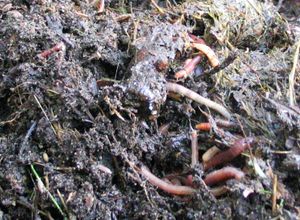Difference between revisions of "Compost"
m (interlinks) |
|||
| (9 intermediate revisions by 3 users not shown) | |||
| Line 1: | Line 1: | ||
| − | '''Compost''' is vital in growing [[plants]]. Compost can be made from [[waste biomass recycling|organic waste]], and enriched with chemicals such as [[ammonia]] | + | [[Image:CompostWithEarthworm.jpg|thumb|right|300px|Compost with Earthworms]] |
| + | '''Compost''' is vital in growing [[plants]]. Compost can be made from [[waste biomass recycling|organic waste]], and enriched with chemicals such as [[ammonia]]. | ||
| − | [[Category: | + | Biomass from food production can also be included in compost as well as animal wastes. Most compost is biomass, and most food producing plants are no more than 50% edible, so for every tonne of food, there is more than one tonne of biomass produced. Compost will be competing for use of biomass with the plastics industry. |
| + | |||
| + | Contamination of compost needs to be addressed as the compost minerals end up in the food chain. Composts that include biological and meat wastes should be heat treated to kill dangerous bacteria. | ||
| + | |||
| + | Composting generates heat and consumes Oxygen, Nitrogen, Carbon and Water. The microorganisms than convert the biomass into soil consume some of the biomass and convert it to CO2, so the activity of the composting organisms needs to be included into the overall mass balance of the life support systems of the settlement. | ||
| + | |||
| + | ==Humans as compost, funeral rites== | ||
| + | |||
| + | [[funeral|Dead bodies]] may be a part of compost. But recycling the dead might be more ceremonial than practical. Each setter consumes about 2.7 kg of food per day, and rejects 2kg of waste. This is about 730 kg per year, or over ten times the settler's average body mass. Over a life expectancy of 80 years, a colonist would produce 58 tonnes of biological waste. Add to this a volume of biomass that should be higher than the mass of food, to complete the compost and recover inedible plant parts, so perhaps another 78 tonnes. Therefore, for a 70 kg colonist the equivalent lifetime soil production mass might be 136 tonnes, or 2000 times more. In such a case the impact from composting the human's body mass would be very small. | ||
| + | |||
| + | |||
| + | [[Category: Agriculture]] | ||
Latest revision as of 07:26, 17 February 2025
Compost is vital in growing plants. Compost can be made from organic waste, and enriched with chemicals such as ammonia.
Biomass from food production can also be included in compost as well as animal wastes. Most compost is biomass, and most food producing plants are no more than 50% edible, so for every tonne of food, there is more than one tonne of biomass produced. Compost will be competing for use of biomass with the plastics industry.
Contamination of compost needs to be addressed as the compost minerals end up in the food chain. Composts that include biological and meat wastes should be heat treated to kill dangerous bacteria.
Composting generates heat and consumes Oxygen, Nitrogen, Carbon and Water. The microorganisms than convert the biomass into soil consume some of the biomass and convert it to CO2, so the activity of the composting organisms needs to be included into the overall mass balance of the life support systems of the settlement.
Humans as compost, funeral rites
Dead bodies may be a part of compost. But recycling the dead might be more ceremonial than practical. Each setter consumes about 2.7 kg of food per day, and rejects 2kg of waste. This is about 730 kg per year, or over ten times the settler's average body mass. Over a life expectancy of 80 years, a colonist would produce 58 tonnes of biological waste. Add to this a volume of biomass that should be higher than the mass of food, to complete the compost and recover inedible plant parts, so perhaps another 78 tonnes. Therefore, for a 70 kg colonist the equivalent lifetime soil production mass might be 136 tonnes, or 2000 times more. In such a case the impact from composting the human's body mass would be very small.







